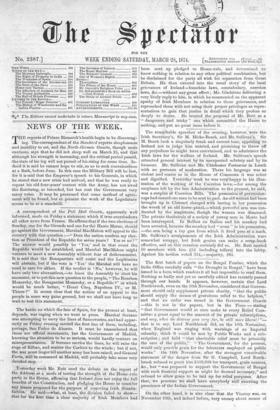The first batch of papers on the Bengal Famine, which
the India Office carefully calls "the Drought in Bengal," have been issued in a form which renders it all but impossible to read them. Nothing so badly and yet so carefully edited has recently passed through our hands. It appears, however, certain that Lord Northbrook, even on the 10th November, considered that Govern- ment should only supplement private charity, "that the public should supply the means of gratuitous relief to the helpless," and that an order was issued in the Government Gazette —this is not in the papere, but in the Times — stating "that Government would at once make to every Relief Com- mittee a grant equal to the amount of its private subscriptions, and may, when the distress goes very far, be still more liberal! "- that is to say, Lord Northbrook did, on the 10th November, when England was ringing With warnings of an Imperial calamity, think it could be met by Public Works and a sub- scription ; and held "that charitable relief must be primarily the care of the public." '! The Government, for the present, would only provide grain for the labourers employed on public works." On 18th November, after the strongest conceivable statement (A the danger from Sir G. Campbell, Lord North- brook refused to grant him /500,000 for transport, grain centres, &c., but "was prepared to support the Government of Bengal with such financial support as might be deemed necessary," and refused to allow grain to be laid up for relief purposes. After that, we presume we shall have everybody still asserting the prescience of the Indian Government.


































